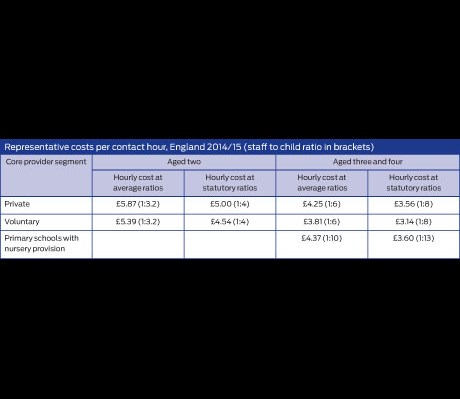30 hours take-up exceeds forecast in York, study shows
Monday, August 7, 2017
Over 200 more places than anticipated were taken up by parents in the city-wide pilot of the 30 hours in York, according to an evaluation report.

Over 200 more places than anticipated were taken up by parents in the city-wide pilot of the 30 hours in York, according to an evaluation report.
York was the only local authority area in the pilot scheme that offered 30 hours places to all eligible children.
The DfE agreed to fund all York children eligible for the extended hours. It estimated that 1,480 children would be eligible and gave York a target to engage at least 70 per cent of these.
The council far exceeded this target and had delivered 1,678 places by the spring term, the ‘Evaluation of Early Implementation of 30 Hours Free Childcare in York’ report found.
Places were in great demand, with parents needing no encouragement to take them up, and the number of eligible families was higher than the Government had estimated.
There was no evidence of providers refusing to offer parents the 30 hours. The report said there was a 100 per cent sign-up rate from private and voluntary providers and a very high level of participation by childminders.
The findings are part of a larger study commissioned by the DfE to evaluate the eight local authorities that tested the implementation of the 30 hours of free childcare for three- and four-year-olds from September 2016. The evaluation was carried out by a team led by Frontier Economics and including researchers from the University of East London and NatCen Social Research.
Researchers carried out surveys with 107 providers and 746 parents in the York pilot. The report also includes in-depth interviews with the City of York Council’s early years team, nine providers and eight parents.
SETTING THE SCENE
York is one of the least-deprived areas of the country, with employment levels above average. It has become more diverse in the past decade, with one in ten of the population from an ethnic minority group, and there has been an increase in migration in recent years. The council’s childcare sufficiency assessment shows that there has been an increase in demand for childcare due to a rising birth rate.

As indicated in the table above, 44 per cent of parents in the survey said they were now using more childcare than before they became eligible for the extended hours, and 41 per cent said they would be using less childcare without the offer.
One in ten parents said they had to change providers to access the 30 hours. The survey also found that 13 per cent of parents, who were using a provider when they became eligible, changed provider to use the extra hours.
However, the report points out that care should be taken when interpreting changes because it is not possible to distinguish between what may be a direct impact of the 30 hours and changes in childcare use and parental work that occur as a child ages regardless of the extra hours. Using parental perceptions of alternative choices in the absence of the 30 hours as indicative of what they might do in an alternative situation should also be interpreted with caution.
Researchers found limited changes in parental employment since taking up the extended funded hours, with a small increase in working hours being most likely to be reported, particularly by mothers.
Just over half (56 per cent) of the parents in the survey said the 30 hours offer meant they had slightly more money to spend, 29 per cent said they had much more money to spend, while 15 per cent said it made no difference. For some families, the extended hours were simply ‘nice to have’.
There were also families where financial gains had been limited because they were no longer receiving help with childcare costs through tax credits. However, these families preferred to receive support through the extended funded hours. ‘I feel better that I’m not taking all the money for the tax credits… [it] could go to others more in need than us,’ one commented.
For other families, the 30 hours made a considerable difference, by making it financially worthwhile to work. One mother said that without the extra hours she would not have returned to work.
For some parents it gave them the chance to work overtime. Some felt their career prospects had benefited because they were able to be more flexible for their employer, or they had been able to do some training or studying.
The extra disposable income meant some families could afford outings, after-school activities and holidays. Some mentioned less stress from being more financially secure. They were able to save for emergencies rather than having to rely on debt. One said, ‘We have started putting money back into the bank account rather than just draining it. It makes such a difference to stress levels.’
CHILDREN’S EXPERIENCE
The report looks at how children may be affected by the extended hours, looking at the implications that accessing more funded provision and use of multiple providers may have and exploring what providers do to ensure positive experiences for children.
It looks at how providers were adapting to the ‘30 hours environment’, as well as the acceptability of children spending more hours in a setting.
Providers that changed from offering one to two sessions a day had to re-plan their activities typically through key worker groups. For example, to ensure that children who stayed all day received a good mix of activities and some rest, bean bags and quiet spaces were provided. In settings also attended by school children, staff had to consider how mixing with older children may affect three- and four-year-olds.
Both parents and providers were typically positive about children spending more hours in a setting. However, these were settings offering the extended hours and parents who were using them, so they were unlikely to believe there was a negative impact on their children.
The parents’ survey found that only 7 per cent believed the 30 hours meant that their child was spending too much time in childcare.
Settings stressed that good-quality provision has proven benefits for children and that giving them the opportunity to spend more than the current 15 universal hours would be beneficial, particularly as children prepare to start school.
These views were echoed by parents, who felt that if a child was happy and settled in a setting, the opportunity to spend extended hours there would be positive for their development.
Parents identified the benefits of the extended funded hours as:
Continuity of care: when the extended hours enabled a child to access a setting every day, compared with the 15 hours that were used over two-and-a-half days to fit around working hours.
Better-quality provision: when funding for the extended hours enabled parents to move the child to a setting that was more expensive, but considered to be of better quality.
More development opportunities from spending more time in a learning environment.
One mother said her son had struggled with his speech, but since he had been spending more time at the playgroup, ‘you can tell daily that he’s becoming clearer and saying more things. I think with him playing more with other kids of his own age has helped.’
CASE STUDY
Natalie Nicklin (main image and right) has two sons – Riley, four, and Kieran, three – and works three days a week as a manager for a market research company.

‘Riley started the 30 hours in September – 12 hours at school and the rest at Funfishers [pre-school and out-of-school]. Funfishers would take Riley to school – he’d stay there for three hours and then they would take him back to nursery and I would collect him at 5.30. It’s a two-minute walk round the corner and they do pick-ups and drop-offs.
‘The fact that I could split the hours across two providers meant that I could do eight hours at work [24 hours a week]. Riley got to experience a bit of what school’s like, then at lunchtime spend the rest of the day playing. Everything’s included – there are no extra charges for meals.
‘The manager, Lesley, was fantastic, always very up to speed with any questions I had about the hours. It makes a big difference if it’s communicated well. When I first registered, they sent me a voucher. This time with Kieran [who had the 15 hours at Funfishers from two and will have 30 hours in September] I registered online through the Childcare Service.
‘I was able to continue with my job and my career. I’ve been there 12 years. I obviously didn’t foresee separating from the boys’ father. Without the 30 hours, life could really have changed for me. Although I didn’t increase my hours I was able to survive financially. It made a huge difference to our daily living – the difference between keeping my home and being able to pay the mortgage and not. It would have cost me more to move in to rented accommodation, as well as the stress and upheaval. It was critical for me.
‘The children love the nursery. And I think parents need that bit of a break so that they can go to work. It’s been fantastic, not worrying about the childcare bills. My stress levels went down, it was a big difference. I wanted that balance of home life and working as well.
‘The positive effect that it had on my mental health – I was able to sleep better at night, which was such a big bonus.’




